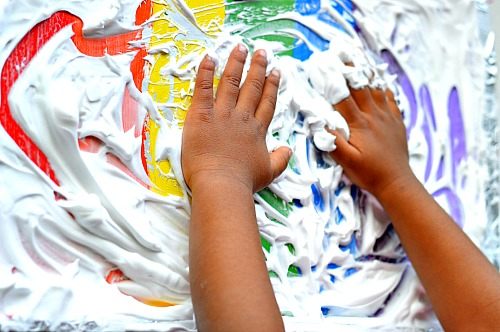Blog
Fun with Sensory Play

It is commonly known that children diagnosed with autism spectrum disorder and/or sensory integration dysfunction disorder have difficulty processing incoming sensory stimuli. However, the truth is that all children need guidance about how to explore their senses. From the time of birth, children begin to discover the world around them via their senses by putting toys in their mouth, making silly sounds with their articulators, and experimenting with sound by covering their ears.
Sensory play involves more than just tactile input and touch. It also involves exploring scents, color combinations, sounds, and tastes. Here are some of the various benefits:
 Sensory play builds language skills by providing children new ways of talking about the world. Experimenting with different tastes, textures, scents, and colors provides children with new ways to explain their environment, wants, and needs. For example, a child may refuse to eat dinner because they do not want the chicken that you served. By exploring tastes, your child will be able to communicate their wants for something potentially salty, crunchy, sweet, or spicy. Increases in communication skills can result in decreases in frustration.
Sensory play builds language skills by providing children new ways of talking about the world. Experimenting with different tastes, textures, scents, and colors provides children with new ways to explain their environment, wants, and needs. For example, a child may refuse to eat dinner because they do not want the chicken that you served. By exploring tastes, your child will be able to communicate their wants for something potentially salty, crunchy, sweet, or spicy. Increases in communication skills can result in decreases in frustration.- Sensory play regulates the internal sensory system and as a result is calming for the child. Exploring physical abilities while spinning in circles, jumping from couch to couch, or swinging on a playground can help your child suppress any feelings of uneasiness that he/she may have been experiencing. This uneasiness could have stemmed from excitement, anxiety, restlessness, or even boredom; but sensory play is sure to do the trick.
 Sensory play improves fine motor skills. There are two types of motor skills acquired during development: fine motor skills and gross motor skills. Gross motor skills involve the large muscle groups needed for walking and running while fine motor skills involve the small muscle groups needed for writing, tying shoes, and self dressing. During sensory play, children foster fine motor skill development by pinching, pouring, grasping, folding, and so much more.
Sensory play improves fine motor skills. There are two types of motor skills acquired during development: fine motor skills and gross motor skills. Gross motor skills involve the large muscle groups needed for walking and running while fine motor skills involve the small muscle groups needed for writing, tying shoes, and self dressing. During sensory play, children foster fine motor skill development by pinching, pouring, grasping, folding, and so much more.
Be sure to incorporate sensory play into your child’s next activity!
Jessica Eberhardt M.S. CF-SLP, TSSLD




